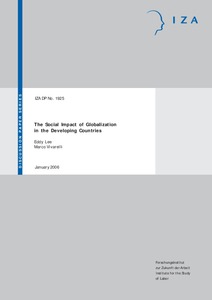The social impact of globalization in the developing countries
"In this paper an ex-post measurable definition of globalization has been used, namely increasing trade openness and FDI. A general result is that the optimistic Heckscher-Ohlin/Stolper-Samuelson predictions do not apply, that is neither employment creation nor the decrease in within-country in...
| Main Authors: | , |
|---|---|
| Institution: | ETUI-European Trade Union Institute |
| Format: | TEXT |
| Language: | English |
| Published: |
Bonn
2006
IZA |
| Subjects: | |
| Online Access: | https://www.labourline.org/KENTIKA-19294524124910127069-The-social-impact-of-globaliza.htm |
| Summary: | "In this paper an ex-post measurable definition of globalization has been used, namely increasing trade openness and FDI. A general result is that the optimistic Heckscher-Ohlin/Stolper-Samuelson predictions do not apply, that is neither employment creation nor the decrease in within-country inequality are automatically assured by increasing trade and FDI. The other main findings of the paper are that: 1) the employment effect can be very diverse in different areas of the world, giving raise to concentration and marginalisation phenomena; 2) increasing trade and FDI do not emerge as the main culprits of increasing within-country income inequality in DCs, although some evidence emerges that import of capital goods may imply an increase in inequality via skill-biased technological change; 3) increasing trade seems to foster economic growth and absolute poverty alleviation, although some important counter-examples emerge." |
|---|---|
| Physical Description: | 26 p. Digital |

